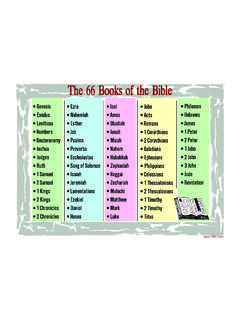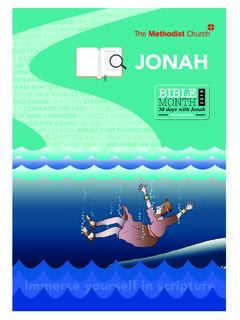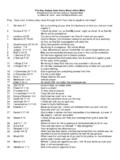Transcription of “You Can Run” Jonah 3: 1-5, 10, Mark 1:14-20 …
1 You Can Run . Jonah 3: 1-5, 10, Mark 1:14-20 . Third Sunday after Epiphany/B. Lynne M. Dolan Perhaps you are familiar with the gospel story we just heard where Jesus calls the first disciples. Jesus announces the kingdom of God has come, repent and believe in the Good News! Then he invites two fishermen to be his first disciples and immediately they leave their boats and lives to follow Jesus. They see a two more fishermen, invite them to come along, and they leave their own father sitting in the boat to follow Jesus. Today's scripture lessons speak of repentance, of turning oneself around and following God's call. I however, want to focus on Jonah , a far more reluctant follower. Last week we heard about Samuel and his profound obedience in answering God's call. We wondered about our own callings and where God might be speaking to us. Samuel's mother prayed many years for a child and when God finally blessed her with Samuel, she promised he would one day become God's special servant.
2 When it came time for God to call Samuel, he faithfully left behind the life he knew and accepted the unknown life to which God was calling him. Well, Jonah has an entirely different story to tell. When God calls Jonah to go to Ninevah to prophesy to his archenemies, Jonah wants nothing to do with it. We have only heard a small portion of this wonderful story. I encourage you to go home today and read the entire book of Jonah . It is no more than three pages long and wildly entertaining (how often can you say that about an entire book of the Bible?). God called Jonah to prophesy and instead of going east to Ninevah, he boards a boat heading thousands of miles in the opposite direction to Tarshish. While aboard, a wild storm erupts. All this time, Jonah is below decking sleeping. The crew franticly tries to figure out what has caused this great storm. They throw one thing after another overboard hoping this will calm the seas.
3 They wonder which one of them has offended the Gods so. Then Jonah emerges to see what is going on. He realizes he must be thrown overboard, because it is he that has disobeyed God. The crew offers a prayer of forgiveness for what they are about to do and reluctantly throws Jonah into the sea, fully expecting him to drown. Now God protects Jonah by having him swallowed by a big fish. That fish has been mythologized as a whale but that is not specifically stated in 1. the biblical account. Jonah stews in the belly of this beast for three days praying to God for guidance and forgiveness. On the third day, the fish spits Jonah out on dry land. Happy to be alive, Jonah thinks this must be the end of his remarkable drama. That is where we pick up the story today. God calls Jonah a second time. This time God has Jonah 's attention. One would think that like most prophets, Jonah had many logical reasons to avoid God's call.
4 Perhaps he did not feel equipped to be a prophet. Given the history between his people and the Ninevites, perhaps he thought they would ignore his impassioned plea. After all, Jonah came to announce their immanent demise. Forty days and you will all be destroyed, he declares. No, it was not Jonah 's lack of self confidence that kept him from answering God's call, but his own loathing of the Ninevites and his profound faith in God. Jonah hated the Ninevites. Quite honestly, he would likely have done a jig on the grave of every last one of them had his prophecy come true. The Ninevites had held the Israelites captive for many years, inflicting pain and torture on them. Death would be welcome retribution. Jonah was not reluctant to do as God asked because he believed God would follow through on God's threat of destruction, but rather that God would not. After all, Jonah had experienced God's love, mercy, forgiveness and grace in profoundly powerful ways.
5 He was afraid, that God would show that same love and mercy to the Ninevites, and Jonah wanted no part of that. Jonah was not afraid to die. After all, he told the crew to toss him over board fully expecting to die for his unfaithfulness. In fact, he was more prepared to die than to answer God's call. However, God spared Jonah . God rescued him and let him stew for a while in a place where he could pray and seek God's forgiveness. But God did not let Jonah off the hook. God gave Jonah a second chance to get it right. This time, Jonah reluctantly does the right thing. After Jonah makes his fateful declaration to the Ninevites, he painfully watches the drama unfold. The Ninevites are moved by Jonah 's warning and repent. Then God spares his enemies and they come to worship the same God Jonah loves and serves. This is more than Jonah can bear. He goes off to sulk. Jonah can't believe that God would love a people whom he has deemed so reprehensible.
6 Jonah was happy to be on the receiving end of God's forgiveness when he had 2. messed up, but was appalled when God treated his enemies with equal mercy. I believe it is far easier for us to see ourselves in Jonah 's story than the disciples'. We can hardly imagine leaving behind our jobs and loved ones to follow Jesus. However, it is not so far fetched to think that we would set out on a slow boat to China in order to avoid doing what God has called us to do. We may not literally board a plane, train or automobile to avoid God's call, but we certainly can find a myriad ways to avoid responding to God, indeed to ignore God altogether. However, this story is about much more than avoiding God's call. Jonah 's story reminds me that racial hatred is an ancient experience, one with profound consequences and one I am ashamed to admit, we have not yet moved entirely beyond. The preacher Kathleen Wakefield says, we may find Jonah amusing, ridiculous, or appalling as he mutters and whines against God's offer of redemption to the Ninevites, and as he tries to run away from God.
7 But, if we let the story touch us, if we plumb the depths of our own hearts, we will find Jonah there within us that part of us that judges and condemns, that desires revenge rather than justice, vengeance instead of mercy. She says, Jonah spends three days inside the whale, in the darkness, so he will have time to think, so he will learn a lesson. We too, spend much time in darkness. The vengeance that we desire, the hurt feelings and grudges and rages that we carry for years weigh us down and eat at us. We are the ones who suffer the most in these situations. It does not hurt the other person the Ninevites were not hurt by Jonah 's reluctance, only Jonah was but it damages us spiritually, relationally, emotionally, and physically. We are the ones spending time in darkness, we are the one imprisoned.. Why is Jonah so angry? The short answer is that God loves too many people. The longer answer, according to Jonah , is that God is gracious and merciful, slow to anger, and abounding in steadfast love, ready to relent from punishing.
8 That is how we expect God to be toward us. That's not always how we want God to be toward others. There is a story about an incident that occurred during a flight from Johannesburg, South Africa, to London, England. A woman with a thick European accent got on the plane. She came down the aisle to the tourist section and discovered her seat assignment put her right next to a man with, 3. shall we say, an African accent. She looked at her seat assignment; she saw it was correct. She asked her seatmate, I'm sorry, are you in the right seat? He smiled and nodded yes. She turned around to see if there were any other empty seats in the section but she didn't see any so she tugged on the sleeve of the flight attendant. Excuse me, she said, as you can see, I'm sitting next to person whose skin color is different from mine. Yes, ma'am, I can see that. Well, she said, this is simply unacceptable. Is there another available seat?
9 The flight attendant looked at her strangely and said, I'm sorry, ma'am, it's against our policy to move people unnecessarily. You don't understand, said the wealthy woman, this arrangement will not do. I have funds in my purse to arrange an alternative. The flight attendant said, You do? Yes, I do. Would you please go up to first class and see if there is an available seat? The flight attendant shrugged her shoulders, walked up the aisle. A few minutes later she returned. She leaned over the European woman, tapped the man with the African accent, and said, I'm sorry, sir. I hate to do this. I must make a seating change. If you would follow me, we have a place for you in first class. In response to this story William Carter says the love of God makes it possible to give every person first class treatment. Sometimes however, we get stuck in our same old seat.. It is easier to hold onto our hatred and suffer silently.
10 Perhaps our willingness to judge and condemn others is really a commentary on how deserving we feel ourselves to be of God's grace and forgiveness. If we do not believe we are deserving of God's love and mercy, it is easier to deny others as well. Imagine how much healing we could bring to ourselves and to our broken world if we could accept God's love and mercy for ourselves and for everyone else. How loving and generous we could be with others if we could learn to be loving and generous with ourselves, God loves everybody. Even Jonah . Even you and me. God is loves those whom we have not yet brought ourselves to love. The difficulty is not telling ourselves this is true. The difficulty is believing it's true for everybody else. May God help us believe that indeed, it is so! Amen Sources: Rev. William Carter, When God Repented, sermon January 23, 2000. 4. Rev. Kathleen L. Whitehead, sermon for third Sunday after Epiphany/B, January 22, 2006.







